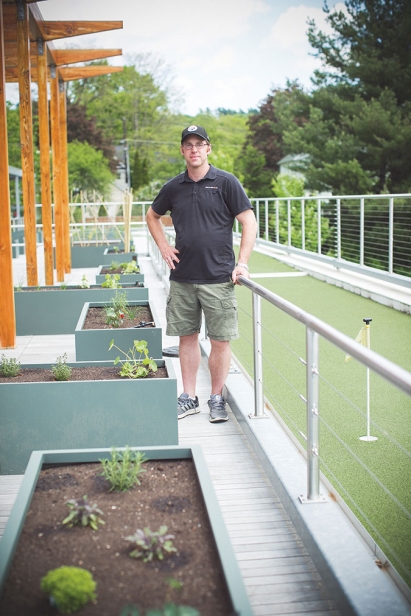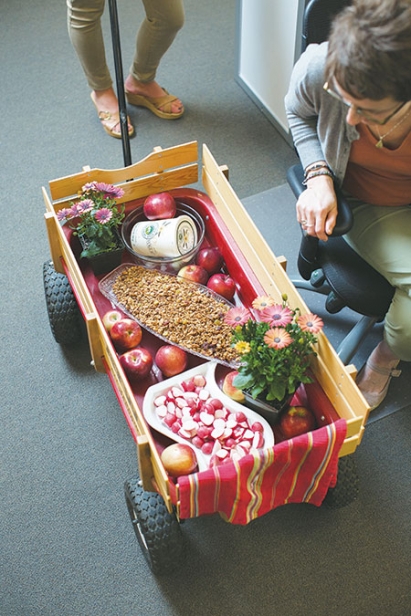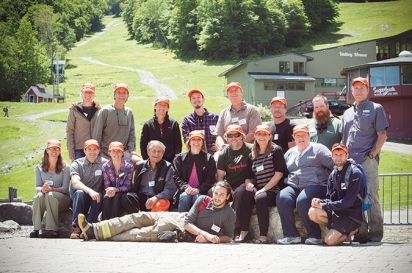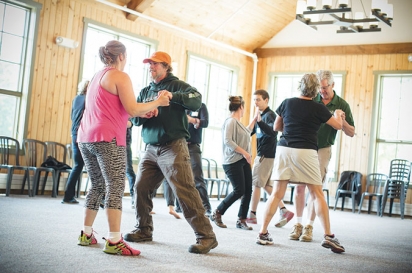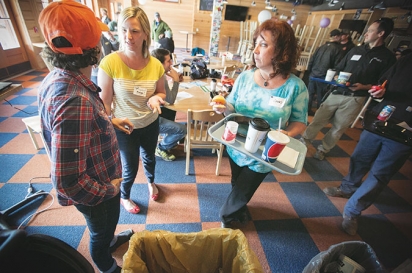Get Well Soon
Like any company, Dealer.com, a Dealertrack Solution, wants healthy employees who enjoy what they do. But as an industry leader in the digital world, the automotive marketing and operations software provider is also keenly aware of its competitors.
“If we create an environment where our employees are happy and healthy, they want to come to work,” says Heidi Brigham, Dealer’s “life director.” “When you have Zappos, Google and Facebook and all those companies that are competing for the top talent, you can’t afford not to have a place where people want to come to work.” Those tech powerhouses are known for promoting healthy lifestyles by offering top-notch exercise facilities, cafés, massage rooms, loaner bikes and at least one nap room in their offices. At Dealer.com, with more than 800 employees at its headquarters on Pine Street in Burlington (and more at locations nationwide), the approach to employee well-being is similar.
With a staff of four including Brigham, Dealer.com’s wellness-focused “life department” works full-time to provide an array of offerings that has grown from an in-house boot camp and a Ping-Pong table to encompass personal training, group exercise, massage, subsidized community-supported agriculture (CSA) shares, cafés that offer only unprocessed foods, and a one-hole mini-putt golf green. The goal, says Brigham, is to meet the needs of employees across all its departments while recognizing that although for many, wellness equals regular workouts, there’s really more to it. When engineers hold 24-hour hackathons, Brigham and her staff provide a massage therapist, a popcorn machine and healthy snacks, indoor roller bikes and a space for dodgeball.
“It’s really trying to have an open mind and making sure that you don’t miss out on a group of people, because we want everyone to be happy,” says Brigham. But for the 87% of employees who do find pleasure in breaking a sweat, Dealer.com has enough options to satisfy. In a space dubbed “The Playground,” there are full-size tennis courts, 40 group fitness classes each week, a basketball court, bicycle storage and loaner bikes, locker rooms, Ping-Pong tables, a strength training room—where employees can receive one-on-one training—and a treatment room for free massages or to meet with an outside chiropractor or physical therapist. In an entirely different section of the building, a CrossFit studio with a retractable roof also hosts Pilates, yoga, spinning and Da Vinci BodyBoard classes. There’s also a beach tennis court adjacent to the building and the mini-putt golf, as well as a solarium for those who want a little downtime.
The focus on wellness at Dealer.com started with a handful of group fitness classes in an effort to give employees midday energy and help them work through creativity blocks. At the same time, vending machines were removed from the company’s offices. Eventually, the offerings grew to include employees’ families. The KB Theatre, named for longtime employee Kaye Borneman, who was killed in a hit-and-run accident in 2010, is not only the site of new employee trainings but also a family movie night a couple of times a year. Family members are invited to take advantage of passes to area museums and the Burlington Tennis Club, and they can join a newsletter mailing list to find out what’s going on that might be of interest to them.
To make employees’ lives less stressful, there are laundry and dry cleaning services on the premises, and people are welcome to order groceries online and have them delivered to the workplace. Two cafés provide nutritious snacks and meals made from as many local products as possible—including herbs that are grown on-site.
“We really want to have healthy, happy employees—a place where you want to come to work, and we’ve created that,” says Brigham.
King Arthur Flour
Although happy and healthy is also the goal for the 300 employees of Norwich-based King Arthur Flour, they have a slightly different motivation: the company’s onsite retail store, with its bakery full of temptations. Among other perks, King Arthur provides employees with free fruit, granola and Greek yogurt; maintains a vegetable garden; and subsidizes CSA shares at a neighboring farm for lower-income staff members.
“We understand that baked goods are yummy,” says public relations manager and spokesperson Katie Walker. “They have sugar and butter and carbohydrates, of course, but that can be part of a managed diet. It’s just part of the culture that with awesome baked goods, you have the ability to treat your body well by having balance with fruits and vegetables.” King Arthur, which shows up frequently on “best places to work” lists both locally and nationally, has a longtime commitment to employee wellness, owing perhaps partially attributable to its being 100% employee owned.
“We all look out for each other and want everyone to be healthy,” says Walker, “because by being healthy, you’re productive, and then the employee-owners reap the benefits of a growing, successful company. It’s taking a very holistic approach.” That translates to a number of what Walker calls “actionable bonuses”: reimbursement for health programs such as weight management and smoking cessation, good healthcare benefits, an on-site gym with low-cost or free fitness classes, and reimbursement for those who belong to gyms elsewhere. Employees who have a green commute—defined as walking, carpooling or biking to work—receive monetary compensation in recognition of that approach. Looping walking trails behind King Arthur are popular not only during the warmer months but in winter, when employees, including Walker, snowshoe around them.
One full-time staffer is dedicated expressly to wellness, bringing in fitness instructors, conducting research on the latest health findings and coordinating “brain food” classes that allow employees in all divisions to work with yeast, learn knife skills and study what it means to be a B Corp, as King Arthur is. A small wellness crew operates a wellness wagon that occasionally travels around headquarters with health treats and wellness tips. A recent wagon focused on oral hygiene, providing toothpaste, a toothbrush and floss to each employee. With stand-up desks, treadmill walking stations, monthly showings of wellness-related TED Talks, and available biometric screenings and flu shot clinics, King Arthur Flour reinforces its employees’ efforts at balance—allowing them room for a few of those baked treats.
Sugarbush Resort
With its two ski mountains, year-round health club, and golf course, Warren’s Sugarbush Resort might not seem like the kind of place where employees have to consciously worry about health and wellness, but as Kathy Brooks, vice president of support services, notes, everyone has his or her own level of fitness and approach to maintaining or improving it.
“We respect and work with those goals so everyone can move forward. Too often programs assume that everybody’s in the same place,” says Brooks. “But everybody has a different body; some drink, some don’t; some smoke, some don’t; so everyone’s goals are vastly different, and to respect that is so important.” By way of example, Brooks mentions a chef who needed—and wanted—to lose weight. His initial target was simply to walk around the resort’s not-insignificant parking lot, so Brooks and other colleagues accompanied him as he made that a routine. He was not the only employee for whom the parking-lot circuit was a substantial effort, says Brooks, noting that Sugarbush employs people across the physical spectrum, from those for whom a brief walk is enough to marathoners and expert skiers.
“The challenge is to make sure no one in the population is left out or feels like they’re not good enough,” she says. “I think for some people it’s ‘I can’t even hit the baseline,’ so we make sure everybody feels welcome.” Annual health guidelines are provided to all employees, and those who adhere to them pay a reduced premium on their medical insurance. With staff numbers ranging from 500 employees in summer to 900 in winter, Sugarbush has fitness events all year: free fitness classes, group snowshoe outings and walks (depending on the season) and Wednesday morning skis with chief recreation officer and extreme skier John Egan. There are smoking cessation programs, a healthy choice lunch as well as a wellness fair every June and occasional brown bag lunches with guest speakers, including a recent one focused on stress management. In May, a number of staffers participated in the Vermont Governor’s Council on Physical Fitness & Sports Corporate Cup Challenge, a 5k run/walk open to businesses, government and nonprofit organizations statewide.
It’s all overseen by the Safety Environmental Wellness Committee (SEW), an employee-driven group that’s responsible for establishing safety and wellness goals for the entire resort, whose motto is “Be better here.” Although that’s aimed at visitors, Brooks says Sugarbush employees should get the benefit of being better there, too.
“We took safety, environment and wellness and wrapped them in one grouping,” she says. “We call it our SEW committee because we think they’re intertwined and they all combine to the overall resort experience. Working with safety, the environment and wellness says to the employees, ‘We care about you.’” Employees have ownership of the SEW committee to ensure their involvement. “I think we all know that commitment works better than compliance,” says Brooks.
The “safety” component of SEW includes instruction in the use of defibrillators and fire extinguishers, CPR and ladder training—all things that are potentially as useful off the job as on it. This past winter, a safety-related goal resort-wide was to clear snow from around the buildings that house employee offices, which are often last on the list for shoveling. Brooks says that led to a communal sense of responsibility for safety around the resort. “Environment” entails increased recycling efforts, including of liquids, and the appearance of “trash talkers,” who ensure guests recycle properly after their meals.
“It’s little things like that that create a higher level of camaraderie” among staffers, says Brooks. “We really tried to have a comprehensive program, to invest in our employees and instill our commitment to the whole concept.”



